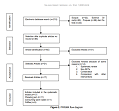A review on reducing the incidence of postoperative ileus by chewing gum, consuming coffee or warm water post abdominal surgery

Downloads
Background: Postoperative ileus is the main complication post abdominal surgery; it signs two or more periods of vomiting and nausea, intolerance of diet more than 24 hours, inability to pass flatus more than 24 hours, and abdomen distension. Several studies are stating that interventions chewing gum, consuming coffee, and drinking warm water can reduce the incidence of postoperative ileus.
Objective: Collects the evidence for effect chewing gum, consuming coffee, and warm water to reduce postoperative ileus.
Method: This systematic review is arranged based on literature studies from five databases last five years, such as Scopus, Sciencedirect, Proquest, and Oxford, with the comprehensive survey, which conducted according to the guidelines in the PRISMA. We searched for studies with the keyword "chewing gum" OR "coffee" OR "warm water" AND "postoperative."
Result: We selected 215 articles from an electronic database, and 17 articles with Randomized Control Trials (RCTs) method included. The sampling of selected items in this systematic review carried for five months to 1 year, from January to December 2010 - 2017, obtained 20 to 975 samples. There was a significant effect of chewing gum, consuming coffee, and warm water reduced postoperative ileus incidence without side effects.
Conclusion: Chewing gum, consuming coffee, and warm water, are effective, safe, and not expensive to reduce the incidence of postoperative ileus and improve recovery post abdominal surgery.Authors retain copyright and grant the journal right of first publication with the work simultaneously licensed under a Creative Commons Attribution-NonCommercial 4.0 International License that allows others to share the work with an acknowledgement of the work's authorship and initial publication in this journal.
Authors are able to enter into separate, additional contractual arrangements for the non-exclusive distribution of the journal's published version of the work (e.g., post it to an institutional repository or publish it in a book), with an acknowledgement of its initial publication in this journal.
Authors are permitted and encouraged to post their work online (e.g., in institutional repositories or on their website) prior to and during the submission process, as it can lead to productive exchanges, as well as earlier and greater citation of published work (See The Effect of Open Access).

This work is licensed under a Creative Commons Attribution-NonCommercial 4.0 International License.











